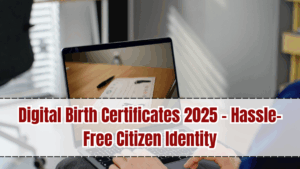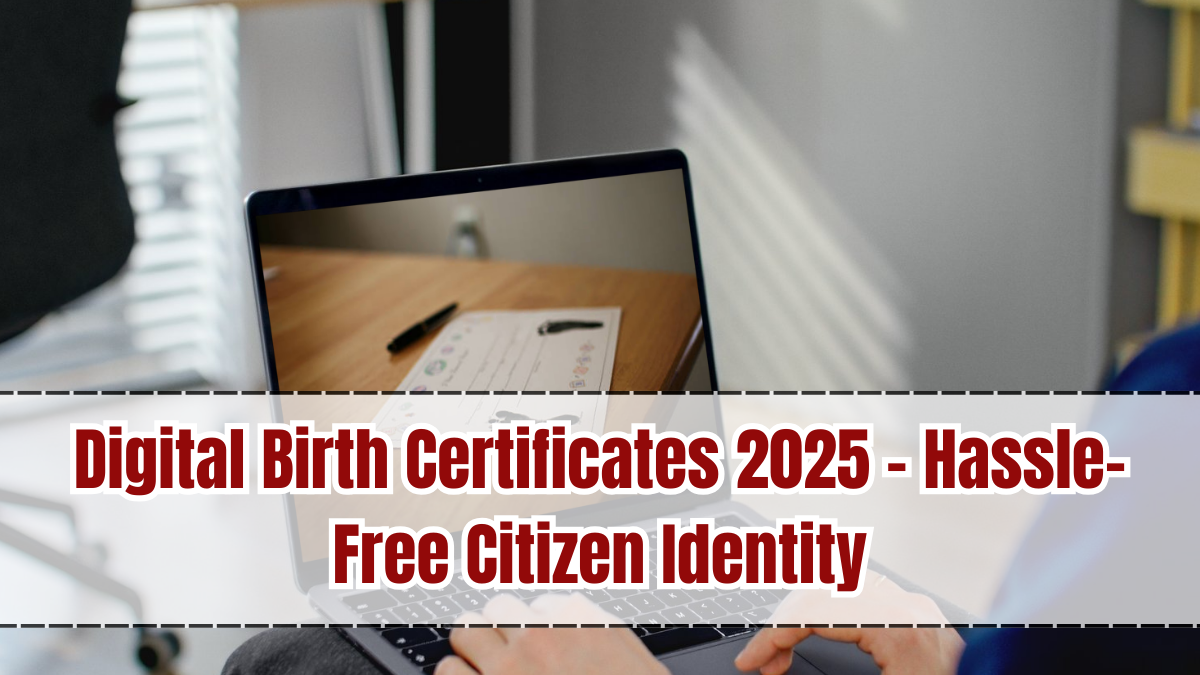Birth certificates are one of the most important documents in a person’s life, required for education, healthcare, passports, and even financial services. Until recently, the process of obtaining one involved long queues at government offices, missing records, and endless paperwork. In 2025, Digital Birth Certificates are changing this outdated system by introducing a seamless, online, and universally accessible identity proof. This is part of the e-governance revolution, making public services faster, more transparent, and citizen-friendly.

What are Digital Birth Certificates?
A Digital Birth Certificate is an officially recognized document issued online by government authorities. Instead of paper-based records that can be lost, damaged, or forged, these certificates are stored in secure digital formats and linked to national identity systems.
Key features include:
-
Instant registration and download through government portals.
-
QR-code verification to prevent fraud.
-
Integration with Aadhaar-like national digital identity systems.
-
Easy accessibility from anywhere through mobile apps or web portals.
-
Permanent storage in government cloud databases.
Why Digital Birth Certificates Matter in 2025
The move towards Digital Birth Certificates 2025 is essential for both governance and citizens.
-
Eliminates Delays: Parents no longer need to visit multiple offices for registration.
-
Universal Access: Certificates can be downloaded anytime, anywhere.
-
Fraud Prevention: QR codes and blockchain-based verification reduce fake documents.
-
Efficiency in Services: Schools, banks, and hospitals can instantly verify identity.
-
Environmental Impact: Reduces reliance on paper, supporting sustainability goals.
By making this process digital, governments are ensuring that every citizen has a secure and verifiable identity from the very start of life.
Benefits of Digital Birth Certificates 2025
The shift to digital is creating wide-ranging benefits:
-
Ease for Parents: New parents can register births directly from hospitals through online portals.
-
Faster Government Services: Passport issuance, school admissions, and social schemes are quicker with digital verification.
-
Permanent Records: No risk of losing or damaging physical copies.
-
Time and Cost Savings: Reduces travel, middlemen, and bureaucratic delays.
-
Global Recognition: Digital certificates are increasingly being accepted for visas and international purposes.
Technology Behind Digital Birth Certificates
The implementation of digital certificates relies on multiple technologies working together:
-
Blockchain for tamper-proof and secure records.
-
QR codes for instant verification.
-
Government cloud storage for permanent availability.
-
Mobile applications to provide citizens access on the go.
-
Integration with national digital IDs to ensure authentication across all public services.
This combination ensures that every certificate is genuine, secure, and universally valid.
Government and Policy Initiatives
Many governments in 2025 are pushing for 100% digital civil registration systems. Key initiatives include:
-
Linking hospitals and maternity centers with government databases for instant registration.
-
Creating unified online portals where citizens can download certificates anytime.
-
Offering multilingual services so citizens across rural and urban areas can access them easily.
-
Collaborating with private tech companies to secure data and improve user experience.
For example, in India, the Digital India initiative is ensuring that birth registrations are directly connected with Aadhaar and accessible through the DigiLocker platform.
Future of Digital Certificates
The future looks promising as Digital Birth Certificates will soon be integrated into a wider digital identity ecosystem. By 2030, governments aim to build a system where birth certificates automatically connect with school records, healthcare systems, and banking services. This will reduce the need for citizens to provide the same information repeatedly and allow frictionless governance.
FAQs
What is a Digital Birth Certificate 2025?
It is an officially recognized online version of a birth certificate that can be downloaded, verified, and stored digitally instead of paper copies.
How do parents register for a Digital Birth Certificate?
In most regions, parents can register births directly through hospitals or online government portals, and certificates can be downloaded instantly.
Is a digital certificate legally valid?
Yes, Digital Birth Certificates are legally recognized and carry the same validity as traditional paper certificates, with added fraud protection.
Can these certificates be used internationally?
Yes, many countries are now accepting digitally verified certificates for visas, education, and other purposes.
What technology ensures the security of digital certificates?
They use blockchain for tamper-proof records, QR codes for instant verification, and government cloud storage for permanent access.
Click here to know more.
